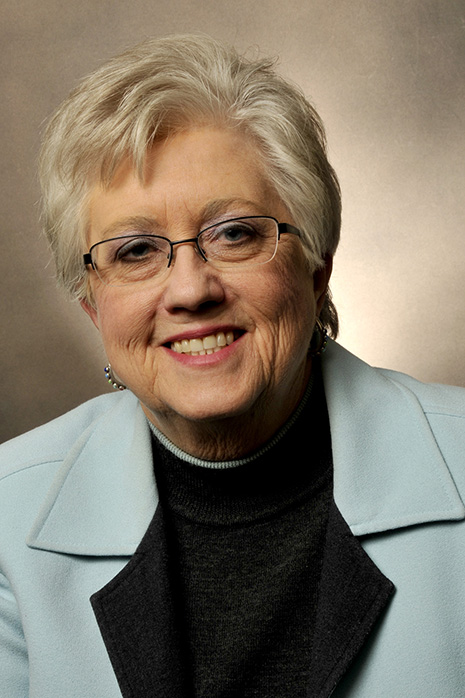
FAYETTEVILLE, Ark. – The University of Arkansas department of agricultural education, communications and technology began offering graduate students the option of completing its master’s degree program in agricultural and extension education online in 2012. Since then enrollment in the graduate program has increased 63 percent overall while online enrollment has more than doubled.
When the Dale Bumpers College of Agricultural, Food and Life Sciences gained approval for the online degree program from the Arkansas Department of Higher Education, there had been 20 students in the agricultural and extension education master’s program. The first year of the online option, in 2012, seven of 22 students were off campus. By the fall of 2013, enrollment grew to 36 with 21 of those taking classes online.
“We saw that distance education was going to be the future of education, and we wanted to be involved in that,” said Donna L. Graham, U of A professor and graduate coordinator for the agricultural education, communications and technology department.
The Bumpers College partnered with the U of A Global Campus for the online option so students aspiring for positions as agricultural science teachers, extension agents, professionals involved in formal or informal education organizations, and agricultural professionals who work with applied agricultural technologies or agricultural communications could further their education while balancing professional, family and financial commitments.
Graham expects the program will continue to keep up with trends in education and technology.
“The University of Arkansas recognizes the students’ need for flexible options and continues to expand its offerings for students online,” said Javier Reyes, vice provost for distance education. “This is a commitment that aligns with the university's Top 5 Distance Education Goals and is part of the strategic initiatives identified by the chancellor. It is part of our mission to educate and empower Arkansans by transforming education in the state.”
Graham said the department was on board for the online transition.
“We all saw the need, that there was an audience we were not tapping,” said Graham. “Our group was very supportive of the idea.”
The department joined AG*IDEA, an affiliate of the Great Plains IDEA, a national consortium of universities offering programs and online courses in agricultural and human sciences.
“In the agricultural education program area, the decision to join AG*IDEA was made to assist students in the timely completion of coursework for the degree program and to offer a greater variety of courses” said Graham. “It also enabled us to add a needed variety of instructional techniques and methodologies.”
A recent survey by Babson Survey Research Group revealed 32 percent of higher education students in the U.S. take at least one course online.
“The old model is that people came to campus and stayed here for two or three years to finish a master’s degree,” said Graham. “But this is not the way it is now because the technology allows us to reach students who are ‘place-bound.’”
The online option also attracts a variety of students. The program appeals to both recent undergraduates and non-traditional students, according to Graham.
“In terms of what these students do, we have people working in industry positions, schools, county government and more,” said Graham. “The degree is something that helps them advance in their positions.”
Tami Shuck, a student enrolled in the online degree program, said this option presents many benefits. “The online program allows me to pursue a master’s degree while working fulltime and parenting a teenager,” she said.
Shuck received her bachelor’s degree in agricultural business. She is now a regulatory services manager at Tyson Foods Inc. and views the online degree as potentially helping her become involved with the Tyson Foods Fellow program and conducting research in an upcoming partnership with World Vision in Africa.
“I am hoping to be a part of this program and the master’s degree will increase my knowledge base and candidacy,” said Shuck.
Shuck, like many students, is combining on-campus courses with the online courses to best fit her schedule.
Sara Beth Waller was the first to take all online courses and graduate with a master’s degree in agricultural and extension education, finishing in spring 2013.
Waller decided to complete the degree completely online because she was working as a county extension agent with Cooperative Extension Service in Garland County. “Attending classes on campus wasn’t an option for me,” said Waller.
She said the educational benefit of completing a master’s degree made it a priority once she started her extension position.
“Working for extension, there are always new educational techniques, and I believe earning this degree will allow me to hold an educated opinion of new techniques and put them to good use in my educational programs,” said Waller.
Students wishing to earn graduate-level credit, whether degree-seeking or a non-degree, must be officially admitted by the Graduate School.
Students enrolled in the program have to complete 33 hours of graduate level work, including:
- 12 hours of core courses
- 3 hours special problem and/or approved 6 hours thesis project
- 15 hours for a thesis option or 18 hours for a non-thesis option elective courses
- Successful completion of an oral or written exam upon fulfillment of requirements
- Cumulative grade point average of 2.85 or higher.
The 12 hours of core courses are Research Methodology in the Social Sciences, Interpreting Social Data in Agriculture, Technical Communication in the Social Sciences, and Philosophy of Agricultural and Extension Education.
Topics
Contacts
Robby Edwards, director of communications
Bumpers College of Agricultural, Food and Life Sci
479-575-4625,
Donna L. Graham,
Bumpers College of Agricultural, Food and Life Sci
479-575-6346,
Kay Murphy, director of communications
Global Campus
479-575-6489,